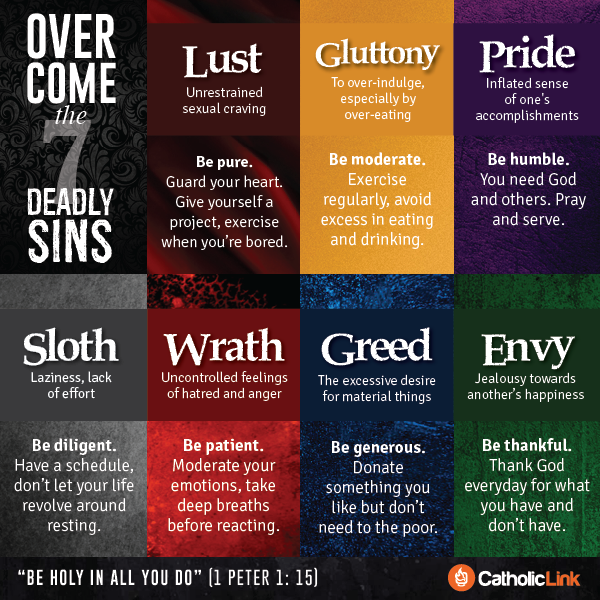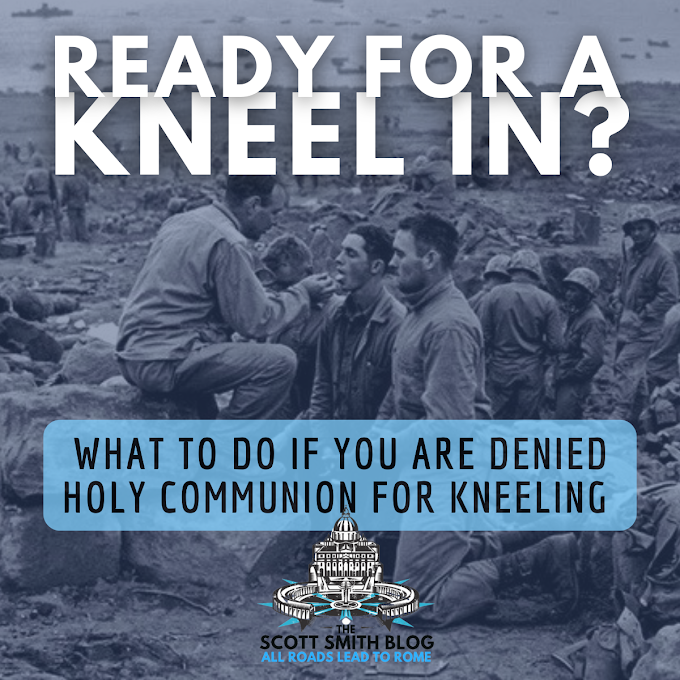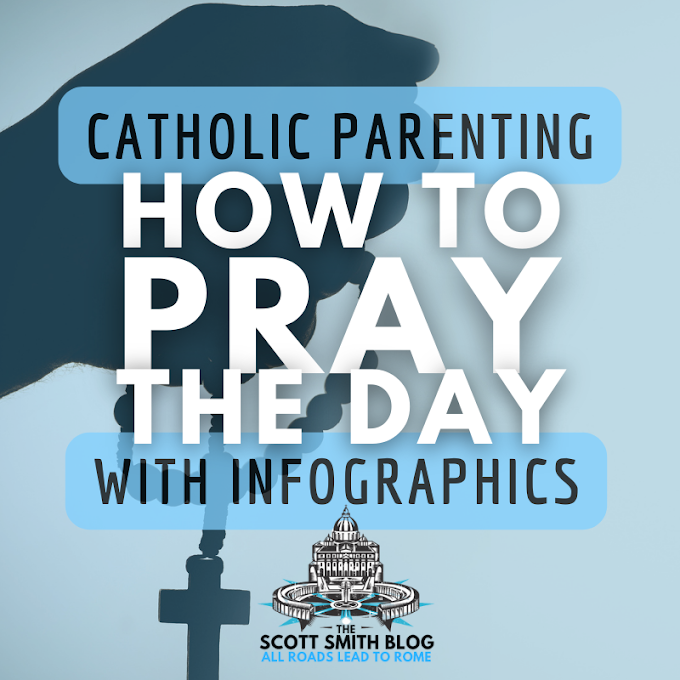Want to teach your kids about virtue? Not only that, want to teach your kids how to defeat vice?
My wife and I started something a while back with our kids. It is just a simple addition to family prayer night.
Each Vice is defeated by a particular Virtue. Each week for seven weeks, the kids pick out a new virtue to pray for and work on all week. I will spell out the specifics below.
Here's the basic idea to help your kids learn virtue. As you will see in the infographic below, each virtue defeats a specific vice.
Afterwards, we will take deep dives into all of the following below:
- What is Virtue?
- What are the 7 Deadly Sins? Plus explanations and Bible verses for each
- What are the 7 Holy Virtues? Plus explanations and Bible verses for each
Infographic: Overcome the 7 Deadly Sins with the 7 Holy Virtues
What Virtues Defeat Which Vices? The Contrarian or Remedial Model of Virtue
You can think of the Seven Virtues as a sword forged to defeat a specific Vice. This is the "remedial" or "contrarian" model of the Seven Holy Virtues. Each specific virtues is the "cure" or "remedy" or "antidote" that stands in opposition to each of the Seven Deadly sins.Prudentius devised this model in 410 AD in his allegorical poem the Psychomachia ("The Battle for the Soul"). Prudentius' scheme of virtues and vices looked something like this:
Humility defeats Pride
Kindness defeats Envy
Temperance defeats Gluttony
Chastity defeats Lust
Patience defeats Wrath
Generosity defeats Greed
Diligence defeats Sloth
Family and Kids Prayer Exercise to Teach Virtue and Defeat Vice
Here are the steps we take for our Virtue Defeats Vice prayer exercise with the kids:
- We cut out different colored rectangles of construction paper and write each of the above on each rectangle. For example, the red rectangle will read "Patience defeats Wrath" because Wrath seems like a red color to us. Envy is green, of course. Beware the green-eyed monster! But whatever you think best. This is our prayer bulletin board:
 | ||
| Oops! Looks like I made Anger the green one. Anger should be red, right? |
- We focus on a different slip of paper each week.
- Who picks out the slip of paper? We try to pick the child that most exemplified the previous week's virtue. We'll also try a rotation, since some of our kids may be too young to understand why they never get to pick a virtue.
- We ask Jesus every night to grant us the grace of this week's Virtue and to use it to defeat the week's Vice. We also use the opportunity to praise expressions of Virtue in the kids and talk about how we could have done better or when we failed to practice virtue.
- Sometimes, we will spend more than a week on a particular Virtue and Vice. (Or, sometimes we just mess up the seven-week schedule)
- At Christmas, we also have a virtue Christmas tree. We slowly [patiently] adorn it with homemade ornaments:
Background on Virtue, the 7 Holy Virtues, and the 7 Deadly Sins
First off, we should probably think about virtue for second. What is it?What is Virtue?
Whatever is true, whatever is honorable, whatever is just, whatever is pure, whatever is lovely, whatever is gracious, if there is any excellence, if there is anything worthy of praise, think about these things. (Philippians 4:8)
According to the Catechism of the Catholic Church, paragraph 1803:
A virtue is an habitual and firm disposition to do the good. It allows the person not only to perform good acts, but to give the best of himself. The virtuous person tends toward the good with all his sensory and spiritual powers; he pursues the good and chooses it in concrete actions.
According to St. Gregory of Nyssa, "The goal of a virtuous life is to become like God."[1]
Virtue is a Habit of the Will
Virtue is a habit of the will, according to Aristotle and St. Thomas Aquinas.[2]It takes time and practice to develop a good habit. Virtue takes practice.
For example, here is a quote from Aristotle's Nicomachean Ethics:
... We become just by doing just acts,Here's a video if you would like a deeper dive into Aristotle's understanding of virtue:
temperate by doing temperate acts,
brave by doing brave acts.[2]
Children are born vicious?
Aquinas is also known for saying, and I paraphrase, "children are born vicious."[3] This may not sound too inspiring, but give me a second. Virtues are habits. Habits take time to develop. If you are just born, you haven't had much time to develop habits or virtues. Except maybe patience!If you are lacking in virtue, you are vicious. Therefore, we parents must teach our children good habits. We must teach our children virtue.
So, what are the Seven Deadly Sins and the Seven Holy Virtues?
What are the Seven Deadly Sins (Vices)?
The Seven Deadly Sins are Pride, Envy, Wrath, Sloth, Greed, Gluttony, and Lust.Here is a listing below with some additional categories:
The Seven Deadly Sins
Three Spiritual Sins
1. Pride (spiritual sin)
2. Envy (spiritual sin)
3. Wrath (spiritual sin affected by body)
Four Corporal Sins
4. Accidia or Sloth (corporal sin)
5. Avaricia/Cupiditas or Greed (corporal sin)
6. Gluttony (corporal sin)
7. Lust (corporal sin)
The Seven Deadly Sins are divided into spiritual and corporal sins. Corporal Sins are sins "of the body." Spiritual Sins are sins "of the spirit." Pride, for example, occurs primarily in our thoughts. Lust, on the other hand, might begin in our thoughts, but is consummated with the body.
Here's a handy infographic for the 7 Deadly Sins ...
Infographic: 7 Deadly Sins
Did you know the Seven Deadly Sins were paired with Seven Holy Virtues? See below ...
Definitions and Bible Verses for Each of the Seven Deadly Sins
You may be asked to define the Seven Deadly Sins. Here are good definitions, not just for adults, but for kids, as well. Defining "lust" for a child can be tricky, right?Here are definitions for each of the Seven Deadly Sins, plus Bible verses for each: (provided by All About God)
- Lust – to have an intense desire or need: “But I tell you that anyone who looks at a woman lustfully has already committed adultery with her in his heart” (Matthew 5:28).
- Gluttony – excess in eating and drinking: “for drunkards and gluttons become poor, and drowsiness clothes them in rags” (Proverbs 23:21).
- Greed - excessive or reprehensible acquisitiveness: “Having lost all sensitivity, they have given themselves over to sensuality so as to indulge in every kind of impurity, with a continual lust for more” (Ephesians 4:19).
- Laziness – disinclined to activity or exertion: not energetic or vigorous: “The way of the sluggard is blocked with thorns, but the path of the upright is a highway” (Proverbs 15:19).
- Wrath – strong vengeful anger or indignation: “A gentle answer turns away wrath, but a harsh word stirs up anger” (Proverbs 15:1)
- Envy – painful or resentful awareness of an advantage enjoyed by another joined with a desire to possess the same advantage: “Therefore, rid yourselves of all malice and all deceit, hypocrisy, envy, and slander of every kind. Like newborn babies, crave pure spiritual milk, so that by it you may grow up in your salvation” (1 Peter 2:1-2).
- Pride - quality or state of being proud – inordinate self esteem: “Pride goes before destruction, a haughty spirit before a fall” (Proverbs 16:18).
Memorize It: Handy Mneumonic for the Seven Deadly Sins
The Seven Deadly Sins are like Plagues of the Soul! PLAGGES. Ok, it's not exactly spelled like "plagues", but pretty close, right?P - Pride
L - Lust
A - Anger/Wrath
G - Greed
G - Gluttony
E - Envy
S - Sloth
What are the Seven Holy Virtues?
Did you know there were Seven Holy Virtues to match and defeat the Seven Deadly Sins?As above, the Seven Holy Virtues are divided in Spiritual and Corporal Virtues:
The Seven Holy Virtues
Three Spiritual (or Theological) Virtues
1. Fides (Faith)
2. Spes (Hope)
3. Caritas (Charity)
The Four Cardinal (or Pagan) Virtues
4. Prudence
5. Temperance
6. Fortitude
7. Justice
Definitions and Bible Verses for Each of the Seven Holy Virtues
You may be asked to define the Seven Holy Virtues. Here are good definitions, not just for adults, but for kids, as well. Sometimes it can be hard defining faith for a child, even though they likely understand it better than we do. Nevertheless, you don't want to be stuck saying something like "faith" - oh, you know, it's when you have faith.Faith (CCC 1814-1816):
Faith is the theological virtue by which we believe in God and believe all that he has said and revealed to us, and that Holy Church proposes for our belief, because he is truth itself.By faith "man freely commits his entire self to God."[4] For this reason the believer seeks to know and do God's will. "The righteous shall live by faith." Living faith "work[s] through charity" (Romans 1:17; Galatians 5:6).
The gift of faith remains in one who has not sinned against it.[5] But "faith apart from works is dead" (James 2:26): when it is deprived of hope and love, faith does not fully unite the believer to Christ and does not make him a living member of his Body.
The disciple of Christ must not only keep the faith and live on it, but also profess it, confidently bear witness to it, and spread it: "All however must be prepared to confess Christ before men and to follow him along the way of the Cross, amidst the persecutions which the Church never lacks."[LG 42; cf. DH 14].
Service of and witness to the faith are necessary for salvation: "So every one who acknowledges me before men, I also will acknowledge before my Father who is in heaven; but whoever denies me before men, I also will deny before my Father who is in heaven" (Matthew 10:32-33).
Hope (CCC 1817-1821)
Hope is the theological virtue by which we desire the kingdom of heaven and eternal life as our happiness, placing our trust in Christ's promises and relying not on our own strength, but on the help of the grace of the Holy Spirit."Let us hold fast the confession of our hope without wavering, for he who promised is faithful" (Hebrews 10:23).
"The Holy Spirit . . . he poured out upon us richly through Jesus Christ our Savior, so that we might be justified by his grace and become heirs in hope of eternal life" (Titus 3:6-7).
The virtue of hope responds to the aspiration to happiness which God has placed in the heart of every man. Hope takes up the hopes that inspire men's activities and purifies them so as to order them to the Kingdom of heaven.
Hope keeps man from discouragement. Hope sustains him during times of abandonment. Hope opens up his heart in expectation of eternal beatitude. Buoyed up by hope, he is preserved from selfishness and led to the happiness that flows from charity.
Charity (CCC 1822-1829) - the "First Virtue"
"If I . . . have not charity," says St. Paul, "I am nothing." Whatever my privilege, service, or even virtue, "if I . . . have not charity, I gain nothing" (1 Corinthians 13:1-4).Charity is superior to all the virtues. It is the first of the theological virtues: "So faith, hope, charity abide, these three. But the greatest of these is charity" (1 Corinthians 13:13).
The practice of all the virtues is animated and inspired by charity, which "binds everything together in perfect harmony" (Colossians 3:14). Charity is the form of the virtues. Charity articulates and orders the virtues among themselves. Charity is the source and the goal of their Christian practice. Charity upholds and purifies our human ability to love, and raises it to the supernatural perfection of divine love.
The practice of the moral life animated by charity gives to the Christian the spiritual freedom of the children of God. He no longer stands before God as a slave, in servile fear, or as a mercenary looking for wages, but as a son responding to the love of him who "first loved us" (cf. 1 John 4:19):
If we turn away from evil out of fear of punishment, we are in the position of slaves. If we pursue the enticement of wages, . . . we resemble mercenaries. Finally if we obey for the sake of the good itself and out of love for him who commands . . . we are in the position of children.[6]
The fruits of charity are joy, peace, and mercy. Charity demands beneficence and fraternal correction. Charity is benevolence. Charity fosters reciprocity and remains disinterested and generous. Charity is friendship and communion.
Love is itself the fulfillment of all our works. There is the goal; that is why we run: we run toward it, and once we reach it, in it we shall find rest.[7]
Prudence (CCC 1806) - the "Charioteer of the Virtues"
Prudence is the virtue that disposes practical reason to discern our true good in every circumstance and to choose the right means of achieving it; "the prudent man looks where he is going" (Proverbs 14:15). "Keep sane and sober for your prayers" (1 Peter 4:7). Prudence is "right reason in action," writes St. Thomas Aquinas, following Aristotle.[8]
Prudence is not to be confused with timidity or fear, nor with duplicity or dissimulation.
[2] cf. Aristotle, Nicomachean Ethics 1103b; Aquinas, DVC 1; ST IaIIae 49.1
[3] cf. Aquinas, Summa theologica, trans. Fathers of the English Dominican Province (New York: Benziger Brothers, 1911-1925), IIIa, q. 68, arts 6.
[4] Dei Verbum 5
[5] cf. Council of Trent (1547): DS 1545
Prudence is called auriga virtutum (the charioteer of the virtues); it guides the other virtues by setting rule and measure. It is prudence that immediately guides the judgment of conscience. The prudent man determines and directs his conduct in accordance with this judgment. With the help of this virtue we apply moral principles to particular cases without error and overcome doubts about the good to achieve and the evil to avoid.
Temperance (CCC 1809)
Temperance is the moral virtue that moderates the attraction of pleasures and provides balance in the use of created goods. It ensures the will's mastery over instincts and keeps desires within the limits of what is honorable.
The temperate person directs the sensitive appetites toward what is good and maintains a healthy discretion: "Do not follow your inclination and strength, walking according to the desires of your heart" (Sirach 5:2; cf. 37:27-31). Temperance is often praised in the Old Testament: "Do not follow your base desires, but restrain your appetites" (Sirach 18:30).
In the New Testament, temperance is called "moderation" or "sobriety." We ought "to live sober, upright, and godly lives in this world" (Titus 2:12).
St. Augustine says the following about Temperance and its relationship to Fortitude, Justice, and Prudence:
To live well is nothing other than to love God with all one's heart, with all one's soul and with all one's efforts; from this it comes about that love is kept whole and uncorrupted (through temperance). No misfortune can disturb it (and this is fortitude). It obeys only [God] (and this is justice), and is careful in discerning things, so as not to be surprised by deceit or trickery (and this is prudence).[9]
 |
| Temperance, Piero del Pollaiuolo |
Fortitude (CCC 1808)
Fortitude is the moral virtue that ensures firmness in difficulties and constancy in the pursuit of the good. It strengthens the resolve to resist temptations and to overcome obstacles in the moral life. The virtue of fortitude enables one to conquer fear, even fear of death, and to face trials and persecutions.
Fortitude disposes one even to renounce and sacrifice his life in defense of a just cause. "The Lord is my strength and my song" (Psalms 118:14). "In the world you have tribulation; but be of good cheer, I have overcome the world" (John 16:33).
Justice (CCC 1807) - the "Virtue of Religion"
Justice is the moral virtue that consists in the constant and firm will to give their due to God and neighbor. Justice toward God is called the "virtue of religion." Justice toward men disposes one to respect the rights of each and to establish in human relationships the harmony that promotes equity with regard to persons and to the common good.
The just man, often mentioned in the Sacred Scriptures, is distinguished by habitual right thinking and the uprightness of his conduct toward his neighbor. "You shall not be partial to the poor or defer to the great, but in righteousness shall you judge your neighbor" (Leviticus 19:15). "Masters, treat your slaves justly and fairly, knowing that you also have a Master in heaven" (Colossians 4:1).
Footnotes: Catholic Dad Guide to Teaching the Virtues
[1] De beatitudinibus, 1:PG 44, 1200D.[2] cf. Aristotle, Nicomachean Ethics 1103b; Aquinas, DVC 1; ST IaIIae 49.1
[3] cf. Aquinas, Summa theologica, trans. Fathers of the English Dominican Province (New York: Benziger Brothers, 1911-1925), IIIa, q. 68, arts 6.
[4] Dei Verbum 5
[5] cf. Council of Trent (1547): DS 1545
[6] St. Basil, Reg. fus. tract., prol. 3:PG 31,896B.
[7] St. Augustine, In ep. Jo. 10,4:PL 35,2057.
[8] Aquinas, STh II-II,47,2.
[9] St. Augustine, De moribus eccl. 1,25,46: PL 32,1330-1331.
[7] St. Augustine, In ep. Jo. 10,4:PL 35,2057.
[8] Aquinas, STh II-II,47,2.
[9] St. Augustine, De moribus eccl. 1,25,46: PL 32,1330-1331.




















9 Comments
the Captain: anger
Gilligan: sloth
the Professor: pride
Mr. Howell: greed
Mrs. Howell: gluttony
Ginger: lust
Mary Ann: envy